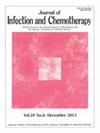Disseminated gonococcal infection developing two days after initial eculizumab administration in a patient with neuromyelitis optica spectrum disorder: A case report and literature review
IF 1.5
4区 医学
Q3 INFECTIOUS DISEASES
引用次数: 0
Abstract
Disseminated gonococcal infection (DGI) is a rare complication of Neisseria gonorrhoeae infection. Eculizumab, a complement C5 inhibitor used in conditions such as paroxysmal nocturnal hemoglobinuria, increases the risk of invasive Neisseria spp. infections. Although previous reports have described DGI in eculizumab-treated patients, evidence involving individuals with neuromyelitis optica spectrum disorder (NMOSD) is limited, and all cases occurred weeks to months after treatment initiation. In the present case, the patient received a quadrivalent meningococcal vaccine before receiving eculizumab. Two days after the first dose, the patient presented with fever, chills, and headache. Laboratory findings revealed leukocytosis and mildly elevated C-reactive protein levels, with unremarkable urinalysis and cerebrospinal fluid results. Blood cultures revealed the presence of N. gonorrhoeae, confirming DGI. A blood test on day 5 revealed a CH50 level of 6.0 U/mL. Screening for other sexually transmitted infections was negative. Antimicrobial susceptibility testing revealed elevated minimum inhibitory concentrations (MICs) for penicillin G, ciprofloxacin, azithromycin, and minocycline, whereas the MIC for ceftriaxone remained low. The patient received intravenous ceftriaxone for 14 days. Following the patient's refusal to continue eculizumab therapy, the patient has chosen inebilizumab, resulting in stable management of NMOSD symptoms. The patient has been attending outpatient appointments approximately every two months, and no recurrence of gonococcal infection has been observed for at least 2 years. This is a case of DGI in a patient with NMOSD, and the earliest reported onset of DGI following eculizumab initiation. Clinicians should remain vigilant for invasive gonococcal infections, even shortly after initiating complement-inhibiting therapy.
1例视谱神经脊髓炎患者首次使用埃曲珠单抗2天后出现播散性淋球菌感染:1例报告和文献综述
播散性淋球菌感染(DGI)是淋病奈瑟菌感染的罕见并发症。Eculizumab是一种补体C5抑制剂,用于阵发性夜间血红蛋白尿等疾病,会增加侵袭性奈瑟菌感染的风险。虽然以前的报告描述了eculizumab治疗患者的DGI,但涉及神经脊髓炎视谱障碍(NMOSD)个体的证据有限,并且所有病例都发生在治疗开始后几周到几个月。在本病例中,患者在接受eculizumab前接受了四价脑膜炎球菌疫苗。第一次给药后2天,患者出现发热、寒战和头痛。实验室结果显示白细胞增多,c反应蛋白水平轻度升高,尿分析和脑脊液结果无明显变化。血液培养显示淋病奈瑟菌的存在,证实了DGI。第5天血液检查显示CH50水平6.0 U/mL。其他性传播感染的筛查结果为阴性。患者静脉注射头孢曲松14天。抗菌药敏试验显示,青霉素G、环丙沙星、阿奇霉素和米诺环素的最低抑菌浓度(MIC)升高,而头孢曲松的最低抑菌浓度(MIC)保持较低。在患者拒绝继续eculizumab治疗后,患者选择了inebilizumab,导致NMOSD症状得到稳定的管理。患者大约每两个月进行一次门诊预约,至少2年未观察到淋球菌感染复发。这是一例NMOSD患者的DGI,也是最早报道的eculizumab启动后DGI的病例。临床医生应该对侵袭性淋球菌感染保持警惕,即使在开始补体抑制治疗后不久。
本文章由计算机程序翻译,如有差异,请以英文原文为准。
求助全文
约1分钟内获得全文
求助全文
来源期刊

Journal of Infection and Chemotherapy
INFECTIOUS DISEASES-PHARMACOLOGY & PHARMACY
CiteScore
4.10
自引率
4.50%
发文量
303
审稿时长
47 days
期刊介绍:
The Journal of Infection and Chemotherapy (JIC) — official journal of the Japanese Society of Chemotherapy and The Japanese Association for Infectious Diseases — welcomes original papers, laboratory or clinical, as well as case reports, notes, committee reports, surveillance and guidelines from all parts of the world on all aspects of chemotherapy, covering the pathogenesis, diagnosis, treatment, and control of infection, including treatment with anticancer drugs. Experimental studies on animal models and pharmacokinetics, and reports on epidemiology and clinical trials are particularly welcome.
 求助内容:
求助内容: 应助结果提醒方式:
应助结果提醒方式:


